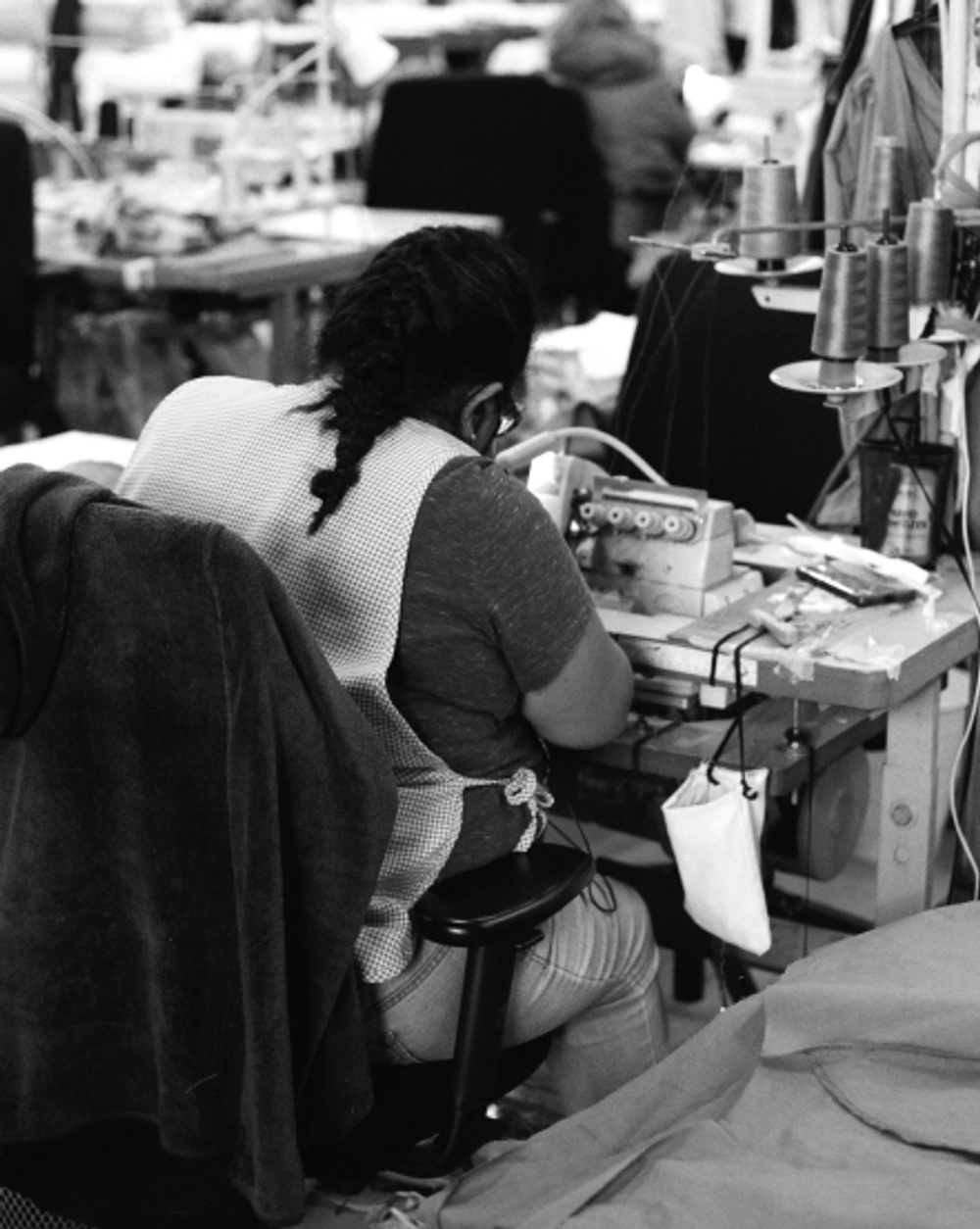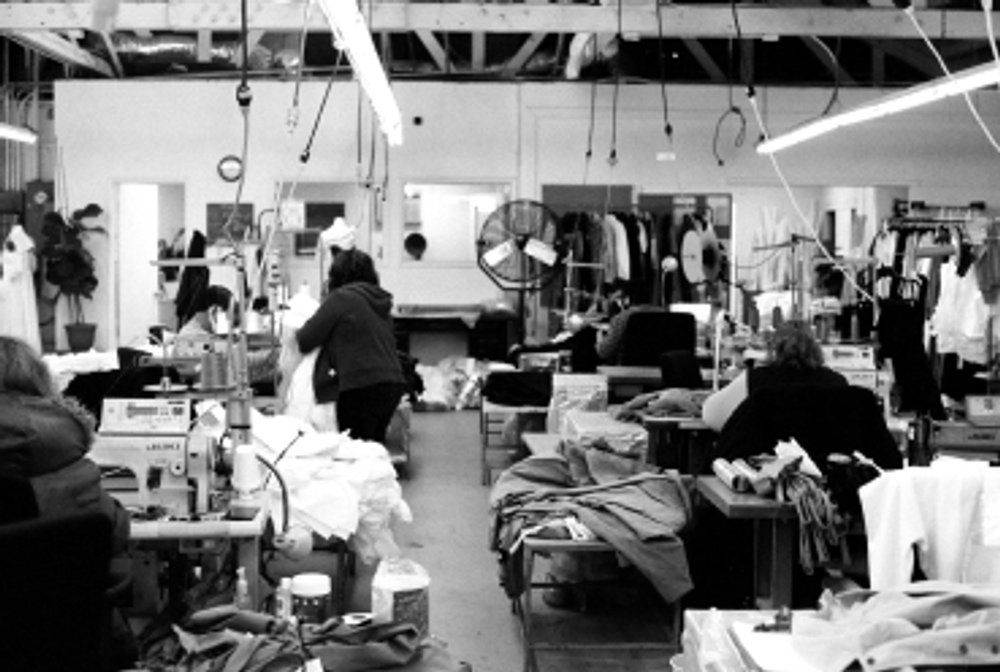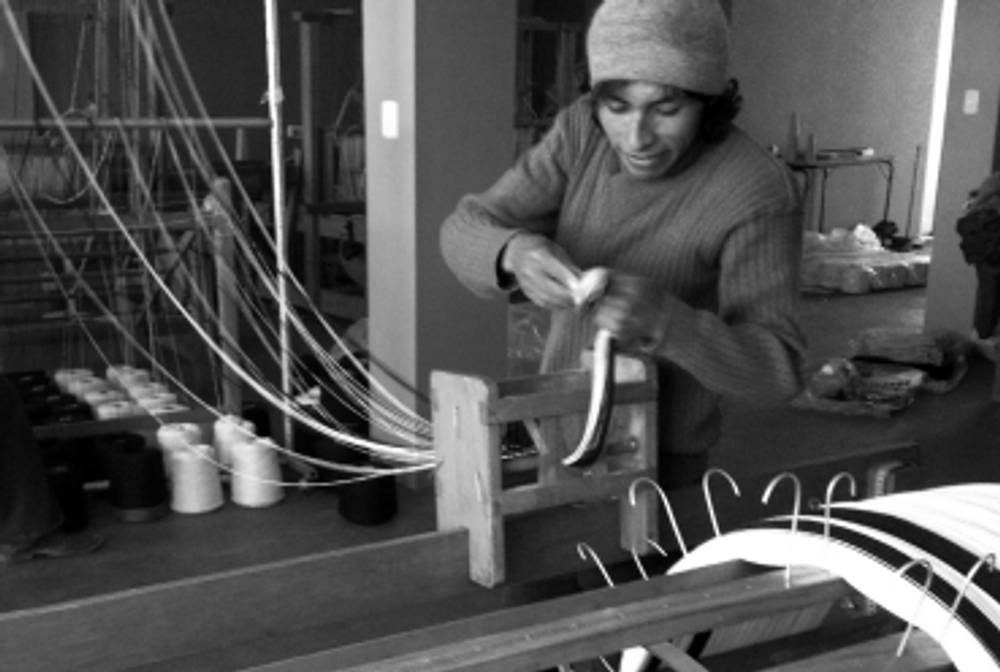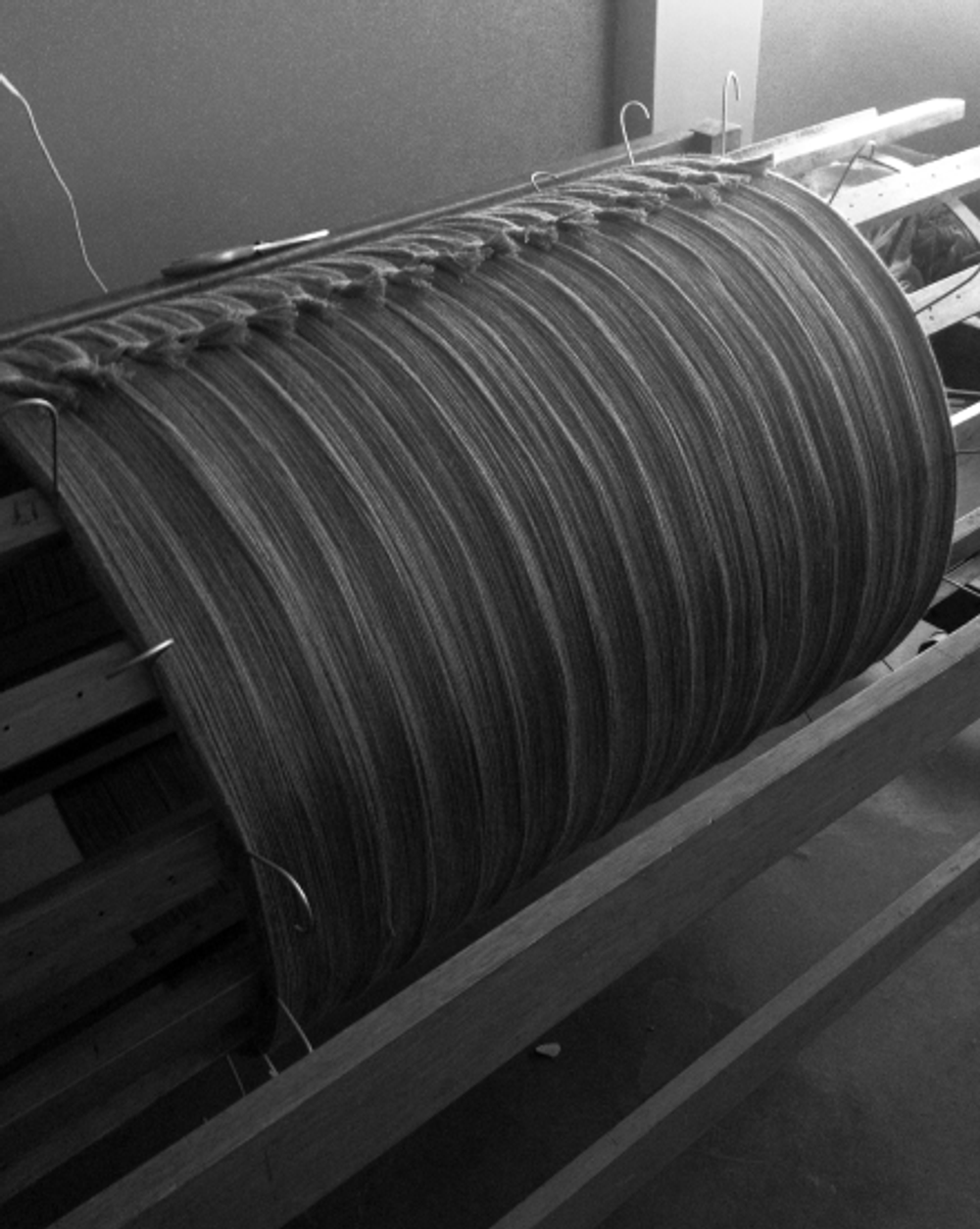Approach
We consider every level of our business through a circular lens — measuring and defining growth through our ability to add regenerative value to people’s lives and with respect to our planet’s resources. We consider the design process a living “circular” organism rather than a straight line, designing waste out of our system by minimizing what’s unnecessary in every step; choosing organic and biodegradable fibers; and implementing a creative use and reuse of our materials. Keeping our team small and production local, we strive to create strong, long-term relationships that are rooted in respect.
Responsible Business Model — We create timeless, well made staples using materials grounded in circularity principles. We craft our pieces with French seams, which take twice as long to sew as the standard overlock seams (and are therefore much more expensive), but yield an incredibly durable and strong garment that is built to last.
Decent Working Conditions — We have personal relationships with our trusted partners in Los Angeles, CA. Each partner must sign our Code of Conduct that upholds both labor and human rights principles. We visit our local factories at least twice a week.
Pollution Reduction — All company vehicles are electric. We keep 90% of our production local to Los Angeles, CA where our warehouse and office is based to limit our carbon emissions. Our Peruvian knitters utilize only materials local to Peru, so nothing is flown in, keeping our carbon footprint as small as possible.
Recycling & Waste — We have a repairs program for customers to extend the lifetime of their Shaina Mote garments. We work with a textile recycling company that recycles 100% of our scraps into new materials. We offer a garment recycling initiative for customers.
Supporting Traditional Skills — Our women-run and owned workshop in Peru utilizes skills native to Peru, specifically utilizing skilled labor in Arequipa area in Lima for weaving and knitting. We work with Alpaca and Pima Cotton fibers, grown by local farmers in Peru.
Organic Materials — We strive to use 100% organic certified Cotton in our designs where ever possible. We currently use about 65% certified organic Cotton in our production, with the goal to reach 100% by 2025.
Safe + Renewable Materials — Our main materials are easily regenerative and natural or deadstock including Lyocell, Cupro, Linen, Flax and Corozo buttons. We use GOTS certified dyes to keep our fabrics safe for the wearer and for the environment.
Energy Efficiency — Where possible, we partner with mills that run their operations on solar or wind power. We provide care instructions to customers on how to care for their garments in ways that reduce energy and water consumption.
Water Efficiency — Our denim comes from an Italian mill that utilizes a fully reclaimed water system in their production. We use textiles like Lyocell and Cupro that require less water to create. We provide care alternatives that save water and energy.
Safe Chemical Management — Our local dye houses work within the state environmental standards for safe chemical waste management and use GOTS-certified dyes which meet global standards for low environmental impact processing. For our denim wash, we use a vegetal compound that is 100% biodegradable, non-toxic, and devoid of hazardous chemicals.
Respecting Animals — We inquire with the mills and farms into the process of any animal byproducts, such aswool or alpaca, to ensure the safety and well-being of any animals used in our designs.
Ethical Sourcing & Supply Chain Management — We work with Value Chain Consultant, Kristine Kim , who helps us create improved social and environmental outcomes for our business. She has worked with labor unions, multilateral organizations, national and municipal governments, and academic institutions to improve the fashion value chain.
To learn more about our practices, explore our 2030 Roadmap
OUR PARTNERS IN LOS ANGELES

All Shaina Mote woven garments are designed, developed, and made in our hometown of Los Angeles. With this, we are able to support the skilled craftsmanship in our local community while affording the opportunity to have hands-on oversight through our entire design process. By working closely with our partners through long-term working relationships, we're able to attain the best quality possible through our partners' expert feedback and close communication; we're also allowed direct visibility into our partners’ business and employment practices, ensuring we are contracting only with entities that meet the highest standards for employee welfare. Lastly, local production reduces the carbon emissions caused by overseas production.



OUR PARTNERS IN PERU

Our knitwear is produced by our trusted partners in Peru — Gisselle and Eunice — who have been our skilled collaborators for six years and who deeply understand the quality and aim of our knitwear designs. In Lima, the duo works with a collective of artisans with varying expertise, each passed down as a part of the Peruvian heritage of weaving and knitting and using local fibers such as Alpaca and Peruvian Pima Cotton. Sourcing yarns that are entirely grown and spun in Peru, we're able to keep raw materials close to where they are knitted, thus eliminating excessive shipping.
To learn more about our practices, explore our → 2030 Roadmap



Fabric & Trim — Our holistic aim is to eliminate waste as a byproduct of our design process and fabric selection. Every fabric we select is intentional, using fibers and trims either sourced from biodegradable materials or made from repurposed natural materials that would otherwise be discarded. We partner with Marimole to recycle 100% of our fabric excess from our production. These materials are then rewoven into beautiful materials or in some cases turned into insulation for buildings. We acknowledge this is a continual work in progress — every season we are finding new ways to make our collections more thoughtful, and we are committed to staying up-to-date with the rapidly changing landscape of ‘responsible’ sourcing.
To learn more about our practices, explore our → 2030 Roadmap
OUR LITHUANIAN PARTNERS
Our Washed Linen and Cotton styles are produced by our partners in Lithuania. With a focus on Oeko-Tex certified European textiles, they source locally in Lithuania and Europe, minimizing the CO2 impact of transportation. The company has a waste-conscious approach to production, incorporating upcycling and repurposing of materials, and using geothermal energy, a clean and self-renewable heating method that doesn’t release any CO2. Our partners are dedicated to providing a safe, fair and ethical work environment to every person involved in their production process.
OUR RECYCLING INITIATIVE
We believe in a responsibility to our environment in the short and long term, recognizing that change is made of both small, everyday choices and large-scale initiatives. With our Recycling Initiative, we invite our community to send in heavily worn Shaina Mote garments to be recycled in exchange for a discount on your next purchase. In the process, we welcome our customers to be a direct part of our circular production process — giving used pieces new life while keeping clothing out of landfills.

We're proud to partner with the women of Marimole on our Recycling Initiative. Marimole is a garment and textile recycling company based in Manhattan that helps disassemble and sort garments into appropriate recycling categories: natural fibers are shredded and re-woven into new materials in Guatemala or India. Poly fibers are chemically recycled, broken down into polymers and reused.
HOW IT WORKS Share with Us — Send images of your Shaina Mote garments to info@shainamote.com — this allows us to help ensure your garments indeed are in poor enough condition for recycling. Our aim is to recycle only tattered, worn, or torn garments that can no longer be worn or repaired. Should your items not qualify for recycling, we can point you in the direction of our Repairs Program or a designer garment reseller who can help to keep your clothing in use. Ship Your Pieces — Once your items are approved for recycling, follow the instructions given by our customer care team and ship the items to our sorting facility. Be Rewarded — Thank you for taking part in our recycling program! You will receive a code in the mail up to 10 days after receipt of your garments. Our Rewards Structure: For each Shaina Mote garment recycled, you will receive a gift card to our website. 1-2 pieces - $25 gift card 3-4 pieces - $50 gift card 5-15 pieces - $100 gift card
FAQ What qualifies for the recycling program? Torn, ripped, badly stained, unwearable garments. How can I learn more about your repair program? Follow the link here to learn more. What if my garment doesn’t qualify for your repair or recycling program? Visit our list of recommended garment resellers who accept and resell Shaina Mote garments or check out our list of suggested charities for donation here .
CLOTHING CARE
We design our pieces to last a lifetime — with proper care and attention to repairs, we envision them as future heirlooms, intended to be worn, loved, and passed down. Generally speaking, less is more when it comes to clothing care — much of our clothing can not and should not be washed in the washing machine regularly as the process can degrade the integrity of the fibers. In general, natural fibers require far less washing than synthetics (and in the case of wovens, will need a bit more steaming and ironing). All natural and cellulosic fibers, like tencel, cotton, alpaca, and cupro, are breathable and thereby less prone to smells, but are usually more prone to wrinkles. Some—like tencel, cupro and alpaca—are naturally moisture-wicking and antimicrobial. Please read the care label on your Shaina Mote garment to ensure you’re using the appropriate method.
To Freshen Up — Try a simple freshen up as an alternative to machine washing — lay the garment flat in a well-ventilated place or hang outdoors away from direct sunlight. Press the garment on the appropriate iron or steam setting. To Remove Odors — A simple 2:1 water-to-vinegar solution in a spray bottle can be effective in lifting odors from a garment. Spray the garment with a fine mist and allow to dry in a well-ventilated place. To Remove Stains — To remove armpit stains and smells, soak the garment in a 2:1 water-to-vinegar solution for 10-20 minutes before rinsing. To Spot Clean — Dab the spot with a mixture of gentle soap and warm water and, using a circular motion, work the solution into the stain with a white washcloth. Be sure to test a patch in a non-visible location before proceeding to spot clean in critical areas. To Hand Wash — Turn your item inside out. Add gentle soap as directed to a wash basin, making sure the water temperature is as indicated on the garment’s care label. Submerge your item and gently agitate so the soap and water is evenly distributed. Allow the items to soak for up to 30 minutes. Then, gently run cool water through the garment until it is no longer soapy and press out excess water. Be sure to wash your garment with like-colored pieces. To dry, lay the item flat in its natural shape in a well-ventilated area. To Dry Clean — If your garment calls for dry cleaning, consider a green dry cleaner — those that forego the use of a chemical called perchloroethylene. You might also consider a simple press or iron if there are no stains.
A Word on Pleats — Pleats are made by folding unsewn fabric, which is covered with paper and then exposed to high heat. The use of polyester is usually needed for a pleated garment to hold its shape. Because the pleat itself is often so precise, care of a pleated garment is best left to a professional. For spot cleaning, please refer to the above note, but be careful not to rub the material too much. Pleated garments should never be machine washed or dried, ironed, steamed, or pressed. To Remove Small Wrinkles from Pleats — A simple trick from travelling with our pleated skirts: hang the item by its shoulders (for a top) or the waistband (for a bottom) in the bathroom while you shower and allow the steam from a shower to gently release wrinkles. Pleated garments should never be steamed or pressed; the light steam from a shower will remove wrinkles while maintaining the integrity of the pleats. To Store — If your clothing ends up in storage for a few months, take care to store it carefully. Using the methods above, clean the garments first and store them either folded or on a hanger. Most knits beg to be folded flat rather than on a hanger so as not to stretch out, whereas wovens can be stored folded or hanging. Costume archivists recommend that garments be able to breathe,but this can be difficult with modern considerations of storage space, as well as moths that prefer natural animal fibers. We recommend storage in airtight bins when clothing is not in use, with a biannual airing out and spring cleaning... unless you are able to provide a tempered and critter-free environment (lucky you).
We stand behind our pieces for a lifetime. Though we have done our best to ensure the best quality of your garment, we understand that sometimes items can need routine maintenance to keep in good working order. If your item is in need of repair, please fill out the below form. Our repairs are free of charge.
REPAIRS WE OFFER -Missing sew-on buttons -Spaghetti straps of ¼” and smaller widths that need to be reattached -Open seams along a seam line -Missing stitches -Zipper replacement -Elastic waistband repair REPAIRS WE DO NOT OFFER -Flattened pleats -Shrunken garments -Sun fading -Ripped fabric that is out of seam lines -Stains of any kind -Missing belts or ties -Slip replacement -Knitted garment repair of any kind Simple Fixes — Simple fixes, such as a missing button or stitch, may be able to be cared for at home. See below for a video on how to do simple repairs yourself, such as stitching a button, patching a hole in a garment, and repairing a torn seam. To Fit — If you love something and it doesn't fit, we recommend having a trusted tailor on call. Garments are made using brand-specific ratios and standard grade rules. Don't doubt your body: embrace it, and let your tailor make the material work for you.
REPAIR PROGRAM TERMS -Our repairs are free of charge -We are only able to accept items to be repaired upon submission and approval of the repair request form. You should receive a response within one week notifying you of your repair request status. Please do not send any items without prior approval - your shipments will not be accepted. -Items to be repaired must be washed and clean prior to shipping to our studio. -Turnaround for repairs can be up to ten weeks -- timing is subject to the current flow of our ongoing production. - Customers are responsible for the cost of shipping to send the item(s) to be repaired. After the item is repaired it will be returned to you free of charge. -At this time, our repairs program is limited to customers shipping to and from an address located within in the US -We are not liable for any lost or stolen merchandise incurred during shipping and we therefore recommend providing tracking information with your shipment. -We reserve the right to refuse any return that does not comply with the conditions stated above.
RESOURCES FOR RESALE & DONATION Resale Directory — If your item is still in great condition, you can resell your garment and give it a second life for a new wearer. Some of our favorite resources are listed here: The Real Real ThredUp Vestiaire Collective
DONATION DIRECTORY Terracycle Zero Waste Box: TerraCycle is a service that categorizes your donated clothing by material to determine a responsible way to dispose of each. Purchase a Zero Waste Box from Terracycle, fill it with clothing, and return it to them. They will recycle, upcycle or reuse the materials as appropriate. Fabric blends will be converted to energy, natural fabrics will be turned into insulation, and synthetic fabrics (like polyester) will be pelletized and made into new plastic products. Dress for Success: Dress for Success is a global non-profit organization that empowers women to achieve economic independence by providing a network of support, professional attire, and the development tools to help women thrive in work and life. Any gently used Shaina Mote garments fall within their donation guidelines. Clothes the Deal: Clothes the Deal is a California-based non-profit that accepts gently used or new, high-quality professional attire for men and women. They respond to the critical needs of job service agencies and their participants, and provide low-income job seekers a professional image and sense of support. American Textile Recycling Service (ATRS): ATRS provides clothing and shoe donation bins across the US and distributes items to secondhand stores, repurposes them into upholstery or automotive stuffing, creates industry wiping rags, and/or donates to disaster relief initiatives. Council for Textile Recycling (CTR): CTR is a non-profit organization committed to creating awareness about keeping our clothing out of landfills. They have an online search tool to locate your nearest clothing donation or recycling location. As resources continue to develop we will add to this growing list. If you are interested in collaborating with us or suggesting other solutions for responsibly discarding unneeded garments, please reach out to us at info@shainamote.com.